

|
Back to |
| The Front Page |
| People |
|
The Sextuple Experience
By Gail Curry Posted August 29, 2001 |
|
||||||||
In the Gail Curry interview reprinted at the end of this article, the retired editor of The Croquet Gazette speaks of her ambitions and state of mind as a serious competitor. The interviewer notes her superb form in the 2000 season. Soon after she laid down her blue pencil as editor, Curry made croquet history. Until she took the field at Budleight Salterton in August of 2001, the highest attainment in croquet was exclusively male. Gail Curryís milestone achievement was instantly bannered in CroquetWorld: "First Female Sextuple!" We asked her to give us a first-person account. Here it is.
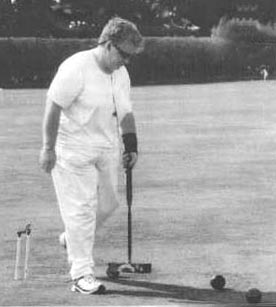
|
| Gail Curry in play at Southport. |
For me and probably for others, the ĎHoly Grailí had to be the Sextuple Peel. Once I had heard accounts of Robert Fulford and Reg Bamford performing such feats I wanted to know how to do them. The next step was to see one in the flesh, so to speak. I witnessed it from the bench, watching one of a remarkable string of sextuples by Reg Bamford. Reg was playing against me in the Coles competition at Cheltenham in May. The funny thing was that the person sitting next to me trying to cheer me up and willing me to get a turn at least while I was being the victim of a Bamford Sextuple was Lionel Tibble, the victim of my own Sextuple some three months later.
So now I had seen the Sextuple in the flesh, I had read the accounts, and I decided this was the target at the top of the tree. I wanted to be the first woman to perform a sextuple in competition.
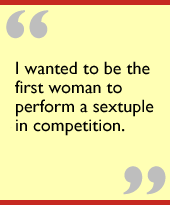
If I have learnt nothing else during my years of work and play it is that I donít often achieve by pressuring myself into performing, even when I feel good. There are lots of reasons for this, and suffice to say that most, if not all, are psychological.
The only practice I performed to achieve my goal was to walk around the court with a set of balls working out the placing of the balls throughout the break for the sextuple. I never actually played the shots. I thought - and still think - it is best to learn the route and then how to drive it. The only practical drills I worked on were cross-wiring and the sextuple leave. Whilst the sextuple was the biggest target, it was not the only target, and I didnít drop everything else in favour of it. I thought it would take few seasons and I was happy to wait, but not too long.
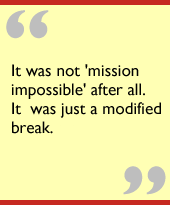
The World Championships in June/July were great fun, but I saw something there in the final that fascinated me: the two opposing ways to perform the sextuple. Robert played with pioneers at his hoops, Reg played by rushing escape balls, or anything for that matter, to his hoops. Real food for thought. I was now developing the view that there was more than one way to skin this cat and, if playing well, it was not the great "mission impossible" after all. It was just a modified break.
My sextuple on my opponent, dear Lionel, occurred in open play. No ĎLadyís Leaveí, no ĎMacho Proper Leaveí. I performed the first peel and jokingly turned to my opponent and said I was going to peel him out. At this point we both giggled. I was sort of serious but I wasnít particularly bothered. It was a nice sunny afternoon, I had Vaughan Williams playing on my Walkman and I was very relaxed.
The next two peels followed; I changed a battery and then realized that I had put a ball in the wrong place and would have to finish with a straight triple as I couldnít play the recovery shot on this particular lawn. Still at this point I was not taking the game seriously, nor was I in the least bit bothered about the straight triple I had just committed myself to, even though I had never completed one before.
The balls followed my bidding almost to the blade of grass, and the last three peels all went according to the script. It was not until I completed the pegging out of the two balls and heard the burst of applause that it dawned on me: I had achieved my ambition! The small matter of the two-ball ending was merely a formality.
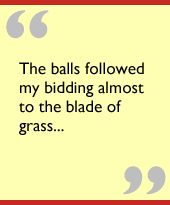
Since that day I have tried to examine what made that game different, but it was not just the game that was different, as since that day I now have an unerring confidence in my own abilities; I have continued to perform at a higher level than before. I donít believe that I am unbeatable or that I can do anything, but I do detect a positive difference in my approach to the game. And Iím interested to see whether and how long it will last.
So what can you learn from my experience? If you have set some goals for yourself, here are my tips on achieving them:
- Relax and enjoy playing.
- Be clear about what it is you want to do.
- Make sure you know how to do it.
- Donít pressure yourself, and donít allow others to pressure you.
- Be patient, you will achieve your goal.
An Interview with Gail Curry,
Former Editor of The Croquet Gazette
by Neil Williams
The following interview by Neil Williams is one of a distinguished series of "Talking Croquet" features in Englandís bimonthly Croquet Gazette. This one was published in May 2001 - Gail Curryís penultimate issue after six years as editor. The interview precedes by several months her historic sextuple peel at Cheltenham.
There are only two living players, I suggest, who will be known to everyone in croquet in England - unless they happen to have spent the last few years on Mars. One is, of course, the Man Himself, John Solomon, and the other is Gail. (We neednít add the surname.)
Although I thought Iíd asked quite tactfully (and it was just for the record, you understand), Gail wouldnít tell me how old she is: "You can say Iím 14 years older than when I started to play croquet in 1986. Really, I always feel 19."
The youngest in the family, she went to school at the local Tynemouth comprehensive. What was that like?
"I couldnít wait to get out, and I was the pupil from hell - you name it, I did it. My final report read: ĎGail has been a pupil at Ralph Gardner for the last 5 years, during which time she has conducted herself entirely to her own satisfaction.í "
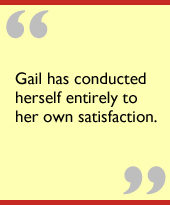
With that kind of send off, whatever next?
"I spent a year as an archaeological assistant, but only learnt about betting and horse racing. I then went to catering college for two years during the day to train as a chef, and worked at night training to be a youth leader - well, I couldnít make my mind up. The youth work finally won out and then social work training and I finally settled into working in residential special education and did an Open University degree."
So how did croquet come into the picture?
"I have my mother and a badly written set of rules to thank for that. We had a garden set but nobody could make sense of the rules. Fortunately, within a week or so of buying the set there was an advert in the local press for a ĎCome and Try ití session at Tyneside Croquet Club. I was dragged along to keep my mother company.
"I picked the game up quite quickly - Iíve always been good at whatever sports Iíve played. But it was late in the season and I was just getting the hang of it when winter put an end to playing croquet. Or it should have done. Not so for me. I can remember going to the library and taking out Solomonís book and Arthur Rossís, and spending many hours trying to follow their thoughts with coloured tennis balls on the carpet. It all seemed straight forwards after a winterís reading. The problem was putting it into practice - but I think I did all right."
I wondered if she still thought that practice and trying things out were important. As it is for most players, time was the problem for Gail. Like most readers of the Gazette, I have never understood how for the last six years she has combined a job, tournament play up and down the country and editing six numbers per year of the Gazette. Despite that, Gail does think practice matters, and would like about an hour a week, covering 3-ball breaks, with and without rushes, to begin with. Hoop approaches would always figure - about 10 minutes on these. She also sees 2-ball breaks as useful, but there is one skill she leaves alone:
"I never practise shooting, because I donít believe it makes any difference. Shooting is all down to confidence - a good relaxed swing, and no thinking about what happens if you miss. Concentrate on hitting."
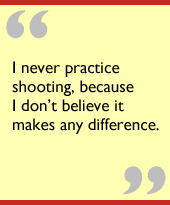
As a player Gail probably still has her best seasons ahead of her, since last year she was virtually unbeatable, and she must already be among the finest lady players in the game, ready to make her mark at the very highest levels. She denies any great ambitions: "I just want to be a better player and I want to continue to enjoy playing."
Her wonderful form in the 2000 season she puts down to "a change of attitude", and I am keen to know what that involved:
"If you had asked me about the psychology of the game before last season I donít think I would have had anything to say. But the last two years have convinced me that a positive mental attitude to life in general is the key to playing croquet, or doing anything else well. I hadnít been enjoying playing and very nearly gave it up. Instead, I decided to give it one more year to see if I could rekindle my appetite for playing.
"I made my mind up that I would be more positive and take on the shots I had previously wanted to play but had often talked myself out of in favour of safety. It wasnít an easy thing to do for the first few games, but the results kept going my way so my confidence grew, and the thought of missing or playing bad shots never enters my head. Of course I do still get things wrong or miss some shots, but not as often, and itís much more exciting to go for shots and get them right than to play safe and still not win. I always remember an article that Colin Irwin wrote a few years ago. The bottom line was: you can either play to win or you can play not to lose. I know which philosophy I follow now."
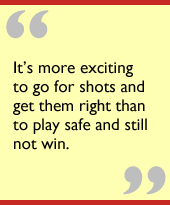
I ask if there are special games or croquet occasions she remembers particularly well. Gailís sense of humour and her refusal to take it all too seriously now resurface:
"I find it easiest to remember the comic occasions for some reason, and there have been enough of those to fill a book. There was the "Umbrella Incident" at Cheltenham, where a certain player was responsible for sitting on another playerís hat - it was no accident. Then there was David Goacher playing quickly to avoid lightning strikes during a storm, also at Cheltenham, strangely. I remember my jacket being hoisted up the flagpole as a "Gale Warning" after my first triple - Cheltenham too. And when I was partnering John Solomon at doubles I asked him if he called ĎThe Solomon Gripí Ďthe Solomon gripí or Ďmy gripí. Then there was the tournament I organised and persuaded all the players to play with every mallet but their own - very, very funny.
"I suppose," Gail added, "the record ought to be set straight here about the infamous Womenís final of 1995. The manager foolishly told Frances Ransom and myself to take as long as we liked to play our best-of-three. Needless to say, we took him at his word and our finals lasted only minutes short of 24 hours in playing time. We could have played more quickly. We just chose not to."
Do you have favourite clubs and events?
"I have quite a few, for all sorts of reasons. I always have a good time at Budleigh in August and treat that as my annual holiday. The Inter-Counties is a special event. It is a great occasion, made by the croquet, the company and the gossip. As to favourite places to play, well call me biased if you like but I donít think there are better lawns in the country than the two we have at Tyneside. So home is my favourite place for quality of lawns. For surroundings and friendly hosts I would choose Crake Valley in the Lake District. [Gail was not paid to say this, nor did I, a member at Crake, twist her arm. Much.] For sentimental reasons too many to list Iíve always had a soft spot for Southport. I owe a lot to some of the members of that club who made me feel most welcome when I was starting out. And they still do."
And so to Gailís time as Editor of the Gazette. I remind her that one of her predecessors had told me that her "least favourite memory" of croquet was her time as Editor. How did Gail feel now she had decided to retire?
"There is a disclaimer at the front of this issue, isnít there? Can I phone a friend?"
I moved on. Well, are there things you wish you had done as Editor but havenít? And are there things you regret?
"I wish I had been tougher from the start and laid down my way of producing the Gazette. Iím sure that more than a few people see me as a bit of a bull in a china shop - someone who speaks first and thinks afterwards. Better that than talking round the table and doing nothing, though.
"In an ideal world I think the Editorís position should be a full time post, combined with that of a national publicity officer. I would then want a Ďreporterí in each Federation, responsible for collecting the news from their own patch. The Australians have that kind of framework and it works. They get a great deal more grass roots news than any others do."
What about a message to your successor? [Not appointed when we did the interview, so nothing personal here, of course.] Gail then quotes Forrest Gump:
" ĎDonít expect anyone to help you. If they do, thatís fine. If they donít, file it away.í "
Do you think we are doing enough to bring on a new generation of players?
"Iím not prepared to comment on what others have done or are doing. If I were in charge of getting more youngsters into croquet I would target school children. I would want them to start with golf croquet and then move into one-ball. Kids canít stand around: they have to keep on the move. I would also ensure they were shown the game by young people who are enthusiastic and can challenge the children. Croquet must be seen as a sport, not an uncool pastime for people too old to do anything else. I would put together a video and a teachersí pack, and I would then look for the groups that had started to play to publicise the sport to others."
Finally, the regular question Gail herself said we should ask all interviewees in our Talking Croquet series: If you could change one thing about croquet, what would it be?
"I have spent hours thinking about this. There are lots of things that could be changed just for the sake of change, but change should be for a reason: ideally, progress. For that reason, the change I would make would be to put a stop to all the argument and bickering between croquet and golf croquet, high handicaps and low handicaps, Associations and World governing bodies. They should work together, not against each other."
Not for me to write her final report as Editor, but Iím sure I speak for many when I suggest that it should read: "Gail has been Editor of the Croquet Gazette for 6 years, during which time she has conducted herself entirely to our satisfaction. We wish her continued success in the future. After all, sheís only 19, so she has made a very promising start."
[Reprinted by permission from the May 2001 issue of The Croquet Gazette.]